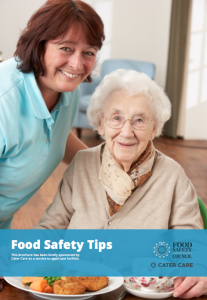
Media release: 30 September 2016
In recognition of the UN International Day of Older Persons on 1 October 2016, the Food Safety Information Council, in conjunction with Cater Care, has launched a brochure about food safety advice when bringing food to family or friends in aged care.
Rachelle Williams, Food Safety Information Council Chair, said that older people are more susceptible to food poisoning as we age and the elderly can suffer severe consequences if they get food poisoning or even die.
‘Older people have the right to enjoy food prepared by family and friends especially if it is a family favourite or a culturally specific food not available in their aged care facility. We just have to remember to be extra careful when preparing this food so we don’t make the person sick. The advice in this brochure can be useful not just for aged care residents but also for preparing food for any elderly friend, neighbour or relative.
‘First always check with the aged care facility about their rules about your taking food in and reheating food as these can vary – remember you are responsible for the safety of the food. Let the staff know if you have bought food in or left some perishable food in the person’s room.
‘You’ll need to follow these 6 simple food safety tips:
- be extra careful with hygiene when preparing the food – wash your hands thoroughly and keep equipment clean
- any food you cook at home should be divided into small portions and chilled in a refrigerator or frozen as soon as it stops steaming and until you leave for the care facility
- transport any chilled or frozen food in a cooler with icepacks
- reheat any cooked dishes at the aged care facility to 75°C to kill any bacteria
- never provide any processed or packaged food after its ‘use by’ or ‘best before’ date
- don’t leave perishable food when you visit or take more than they can eat while you are there unless you are sure the food can be safely refrigerated.
‘There are also a number of foods that are too risky for elderly people to eat. Foods containing raw egg and are not cooked such as eggnog, home-made egg mayonnaise, aioli, hollandaise sauce or uncooked desserts like tiramisu shouldn’t be provided to the elderly. Nor should they eat the higher risk foods that could be contaminated with Listeria, a potentially fatal food poisoning bacteria. These include cold sliced meats, cold cooked chicken; paté, liverwurst or meat spreads; pre-prepared fruit and vegetable salads from salad bars; soft cheeses like Brie or Camembert; and cheeses made from raw/unpasteurised milk.
‘Finally we would like to thank our long-term member, Cater Care, for sponsoring the printing and distribution of this brochure as a service to aged care facilities. With the loss of our long term Federal Government funding it is only with sponsorship like this that we can distribute our important food safety messages,’ Ms Williams concluded.
You can download the brochure ‘Do you bring food to an elderly friend or relative in an aged care facility’ from here or order hard copies of brochure free of charge from Cater Care by completing details on this link or by scanning this QR code

Media Contact: Lydia Buchtmann, Food Safety Information Council, 0407 626 688 info@foodsafety.asn.au
The Food Safety Information Council is Australia’s leading disseminator of consumer-targeted food safety information and a health promotion charity. Australian Food Safety Week 6 o 12 November 2016 is the major activity of the Food Safety Information Council. For further Information and how to donate see: www.foodsafety.asn.au
